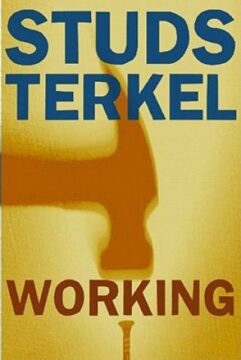by Mark R. DeLong
Human beings thought with their hands. It was their hands that were the answer of curiosity, that felt and pinched and turned and lifted and hefted. There were animals that had brains of respectable size, but they had no hands and that made all the difference. (Isaac Asimov, Foundation’s Edge)
 Eugene Russell, a piano tuner interviewed by Studs Terkel in Working, said with satisfaction that the computer wouldn’t be replacing him anytime soon, even though he mentioned electronic devices—“an assist,” he said, that helps tuners. Eugene’s wife Natalie felt otherwise, saying at one point in their conversation, “It’s an electronic thing now. Anyone in the world can tune a piano with it. You can actually have a tin ear like a night club boss.”
Eugene Russell, a piano tuner interviewed by Studs Terkel in Working, said with satisfaction that the computer wouldn’t be replacing him anytime soon, even though he mentioned electronic devices—“an assist,” he said, that helps tuners. Eugene’s wife Natalie felt otherwise, saying at one point in their conversation, “It’s an electronic thing now. Anyone in the world can tune a piano with it. You can actually have a tin ear like a night club boss.”
Eugene mixed elements of beauty and delight with the technical complexity of piano tuning, recalling how he would “hear great big fat augmented chords that you don’t hear in music today” and that he would come home and say, “I just heard a diminished chord today!” Once he was tuning a piano in a hotel ballroom during “a symposium of computer manufacturers. One of these men came up and tapped me on the shoulder. ‘Someday we’re going to get your job.’ I laughed. By the time you isolate an infinite number of harmonics, you’re going to use up a couple billion dollars worth of equipment to get down to the basic fundamental that I work with my ear.”
The piano tuner feels and practices the tune, which is hardly reducible to formulae, perhaps because it is one of those things in life that’s approximated, but not unambiguously achieved. At best, tuning a piano is a compromise: “The nature of equal temperament makes it impossible to really put a piano in tune,” Eugene explained. “The system is out of tune with itself. But it’s so close to in tune that it’s compatible.” Read more »
